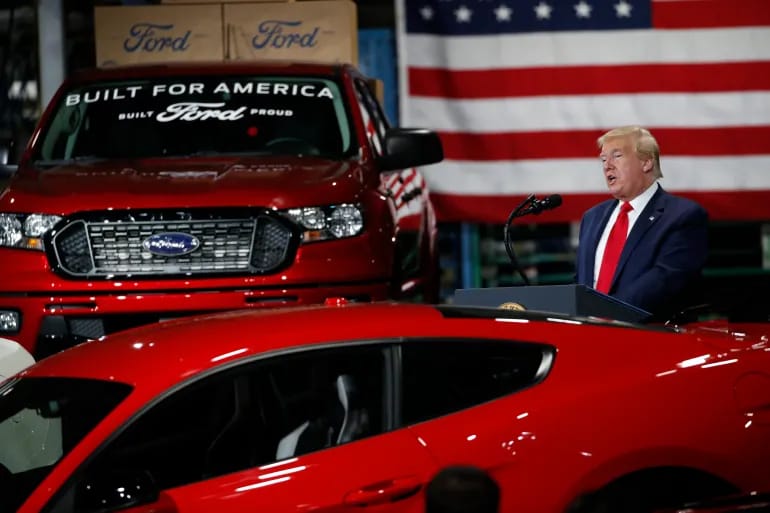In a high-stakes political showdown, former United States President Donald Trump made a strategic visit to Michigan on Wednesday, just one day after President Joe Biden’s visit to Detroit. The back-to-back visits underline the critical importance of working-class votes in key Rust Belt battleground states as the 2024 presidential election looms on the horizon.
Significance of Working-Class Vote
Both Trump and Biden’s visits to Michigan underscore the pivotal role that Rust Belt battleground states will play in the upcoming presidential election. These states, including Michigan, Ohio, Pennsylvania, and Wisconsin, hold the keys to victory for both candidates. In the 2016 election, Trump’s surprising victories in these states propelled him to the presidency, tapping into the frustrations of residents who had witnessed the decline of their manufacturing industries and the waning influence of traditionally Democratic-voting unions.
Biden, on the other hand, reclaimed these Rust Belt states for the Democrats in the 2020 election by emphasizing his unwavering support for organized labor and his roots in Scranton, Pennsylvania. As both candidates vie for the working-class vote in 2024, Michigan has emerged as a critical battleground where their strategies are put to the test.
Trump’s Pledge to Save Autoworkers
Ahead of his visit, Trump expressed his commitment to “save” autoworkers in the Rust Belt, a region synonymous with American manufacturing heritage. In a tweet, he declared, “Heading to Michigan now. I LOVE, & WILL SAVE THE AUTOWORKERS. MAKE AMERICA GREAT AGAIN!” This sentiment resonates with his broader appeal to working-class voters who supported his “America First” agenda during his previous term in office.
Trump’s prime-time address at a Detroit auto-parts supplier is timed to coincide with the second Republican presidential debate, further highlighting his commanding lead among Republican voters and his decision to skip televised primary debates. The former president’s focus on Michigan is indicative of his recognition that securing this Rust Belt state is essential to his path to victory in 2024.
Divisive Debate over Electric Vehicles
One of the central issues dividing Trump and Biden’s approaches is the transition to electric vehicles. Trump has been critical of Biden’s support for electric vehicles, asserting that this shift would harm segments of the traditional automotive industry and result in job losses. In a statement, Trump declared, “Joe Biden’s draconian and indefensible electric vehicle mandate will annihilate the US auto industry and cost countless thousands of autoworkers their jobs.”
The Biden administration, however, maintains that the shift to electric vehicles will create high-paying union jobs. To support this transition, the administration has unveiled substantial grants and loans. Nevertheless, the issue remains contentious within the autoworker community.
On Wednesday, Trump will address supporters at Drake Enterprises, a non-unionized auto parts supplier in Michigan. This choice of venue aligns with Trump’s stance against electric vehicles and the potential impact on businesses like Drake Enterprises. The speech is expected to draw a crowd of current and former UAW members, as well as members of plumbers and pipefitters unions, all of whom have vested interests in the outcome of this debate.
While the UAW has not yet endorsed a candidate for the 2024 election, the union previously supported Biden in 2020. UAW President Shawn Fain remains critical of Trump, expressing doubts about his commitment to working-class people. “I don’t think he cares about working-class people,” Fain remarked. “I think he cares about the billionaire class, he cares about the corporate interests. I think he’s just trying to pander to people and say what they want to hear, and it’s a shame.” The UAW represents a significant union voting bloc, with hundreds of thousands of active and retired members in the US and Canada.
As Trump and Biden continue their efforts to court autoworkers and working-class voters in Michigan, the state is poised to play a pivotal role in shaping the outcome of the 2024 presidential election. The battle for the Rust Belt is heating up, and the working-class vote remains firmly in the spotlight.
















